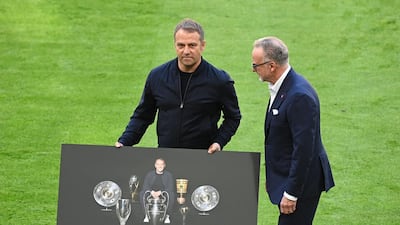In a recent column, I wrote about how Thomas Tuchel proved to be an inspired appointment by Chelsea after guiding them to glory in the Champions League.
But Tuchel is far from alone in the success story of German coaches in recent years. The likes of Hansi Flick, Jurgen Klopp and Julian Nagelsmann are also all considered among the finest managers in football.
In the last few years, they have won every trophy going in club football, from the Bundesliga and Premier League, to Fifa World Club Cup and Uefa Champions League.
When Bayern Munich appointed Flick's replacement at the Bavarian giants, club president Herbert Hainer said Nagelsmann "represents a new generation of managers".
But for me, it represents much more than that. It represents the consolidation of the German school of coaching.
At 33, Nagelsmann is considered one of the most talented young coaches in Europe, having taken Leipzig to the Champions League semi-final in 2020 – where they lost to Tuchel's Paris Saint-Germain.
Bayern are thought to have paid Leipzig €25 million [$30.3m] – a world record fee for a manager – to secure his services for the next five years.
But what are the reasons behind the extraordinary success of these coaches?
In addition to embracing cutting-edge analytical technologies, there is something else that all of these coaches have in common: personality, charisma and the fact they were all trained on the "Fussball-Lehrer" (Football-Teacher) course from the German Football Federation (DFB).
Indeed, Fussball-Lehrer has built a reputation as one of the most prestigious courses of its kind in Europe. It is located in the city of Hennef, near Cologne, and admits only 25 candidates per year.
The course is highly selective. Candidates are analysed and interviewed in detail and only those who meet their strict criteria are selected to join the course, which has had Tuchel, Nagelsmann and the new manager of Borussia Dortmund, Marco Rose, among their most recent graduates.

In fact, personality and charisma – and the ability to convince players of their methods – are crucial factors in how trainees are selected for the course, as are the coach's analytical skills and ability to plan a training session using new technologies. This methodology is bearing fruit.
Jurgen Klopp won the Champions League and ended Liverpool's 30-year wait for the English league title. Nagelsmann and Tuchel led Leipzig and PSG, respectively, to the Champions League final and last four – with Tuchel, of course, going all the way with Chelsea less than a year later.
Hansi Flick achieved the seemingly impossible with Bayern Munich, leading the team to a remarkable six trophies in 12 months and retained the Bundesliga in his second season. He will take over from Joachim Low as Germany manager after this summer's European Championships.
The selection policy of the German school has a strong impact on the youngest and this is already reflected in the German top-flight where 12 of the 18 managers are under the age of 50.
German training technique begins to pose a dilemma for the sporting directors of the great European teams.
Which type of manager should they go for? The former top-level player who became a coach, who knows dressing rooms inside out like Pep Guardiola or Zinedine Zidane? Or is it the "laptop trainer", who has never played for a big club and has acquired his knowledge in the academic and highly technological environment in a series of sports universities such as Tuchel, Klopp and Nagelsmann?
Let's see what the future holds.


